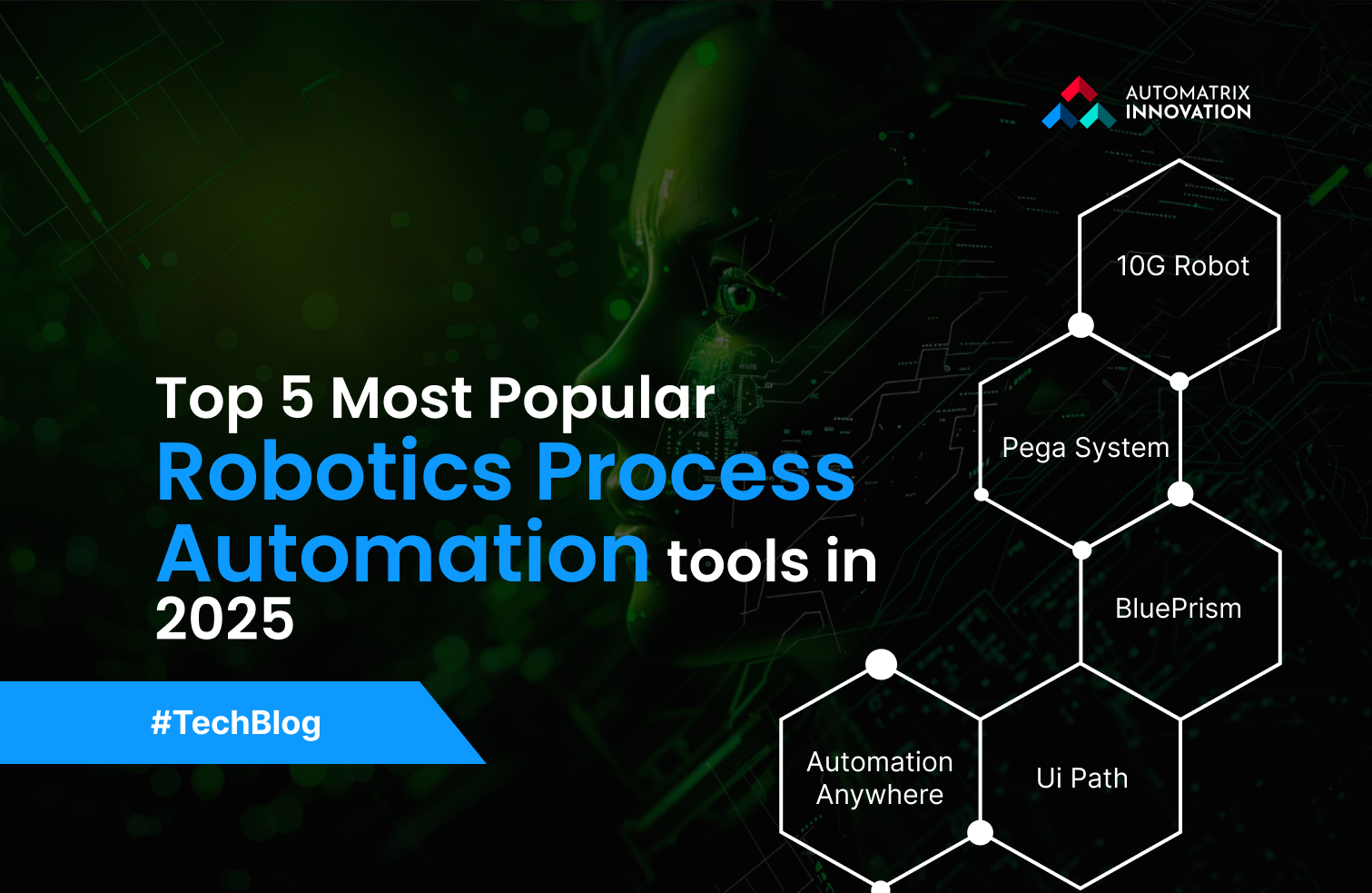RPATop 5 Most Popular Robotics Process Automation Tools in 2025
05 May 2025

We are living in a fast paced business world, where everything happens too often, too fast. Keeping costs and productivity in mind, every organization must have to work tirelessly and endlessly to keep up with the changing times and needs. This is the place where Robotics Process Automation emerges as a solution. RPA has created a great buzz in and around the technology. RPA is a software robot that does easy and repetitive tasks. Before developing any such software, selecting the proper RPA tools is a crucial thing in RPA automation. It impacts RPA implementation.
Top RPA tools in 2025
It’s very tough to focus on 2025’s most popular RPA tools as there are various tools and many RPA vendors use their own tools to implement their business processes. However, we are focusing on the top 5 RPA tools that will help to decide and streamline their business gaps.
1.UiPath
UiPath is a global software company based in New York city. It is very easy to manage and automate business processes and streamline their work with the help of Uipath RPA tool.
UiPath supports both on-premise and cloud deployment, allowing businesses to manage all automation activities from a centralized platform. It leverages technologies like Microsoft SharePoint workflows and Kibana for elastic search capabilities.
Pros:
- User-friendly interface with a simple drag-and-drop design.
- Backed by a large user community and strong support materials.
- Flexible enough to meet the needs of both small businesses and large organizations.
Cons:
- Costs can add up, especially with the need for multiple licenses.
- Demands high system resources for optimal performance.
- Software updates may occasionally cause stability issues.
2.Blue Prism
Blue Prism is a UK based global software company and one of the largest in the field of Robotic Process Automation. It was designed to minimize manual, repetitive tasks that are high-risk and deliver low returns, such as data entry and back-office processing.
Pros:
- Built-in enterprise-grade security and compliance measures
- Highly scalable, ideal for large organizations
- Seamless integration with various enterprise IT systems
- Visual process designer minimizes the need for advanced programming knowledge
Cons:
- Learning curve is steeper compared to tools like UiPath or Automation Anywhere
- Smaller community and fewer third-party resources
- Higher licensing costs may not be ideal for small businesses.
3.Automation Anywhere
Automation Anywhere is a California based company, is a leading RPA platform designed to help businesses build a digital workforce through intelligent bots that automate end-to-end business processes.
Pros:
- Intuitive and easy-to-use platform combining both attended and unattended automation
- Robust AI and analytics features for smarter automation
- Strong customer support and an active user community
- Flexible deployment options – cloud, on-premise, or hybrid
Cons:
- Licensing costs may be high for smaller companies
- Advanced automation may require technical expertise
- May face performance challenges when handling large-scale workloads
4.Pega Systems:
Streamlining crucial business processes, elevating customer experiences, or driving digital transformation, Pega Systems has it all to fulfill the requirement. It ensures enterprises achieve operational excellence through process automation, case management, and strong artificial intelligence capabilities.
Pros:
- It is a combination of business process, case management and AI in one platform .
- Low code development simplifies application development.
- Increases compliances.
- Runs of dedicated workstation.
Cons:
- Licensing can be expensive.
- Configuring or developing integrations with specific third-party tools can demand extra effort.
5. 10G Robot:
10G Robot is a next-generation RPA tool designed to help all types of businesses with Intelligent Automation. 10G Robot stands for an ideal choice for all the organisations who want to automate tasks. Its intuitive interface and powerful backend engine make it easy to deploy bots that handle repetitive operations, data entries, system updates, and more.
Pros:
- Ideal for business users with a non-technical team.
- It has a quick deployment service.
- Designed to support growing business without heavy licensing costs.
- Allow users to tailor various processes based on their unique business needs.
Cons:
- Currently growing its business and third-party community.
- Advanced custom coding features are limited compared to more mature platforms
Conclusion:
Every RPA tool has its own features to automate their business processes. They all have strong capabilities and allow them to run bots at scheduled times on a large scale. But before choosing any RPA tool, it is important to think carefully about which tool helps in your business needs.
Thinking about adding RPA to your business process?
Automatrix Innovation helped companies save 25% to 50% in costs, improve accuracy, and speed up their workflows with less manual work.
